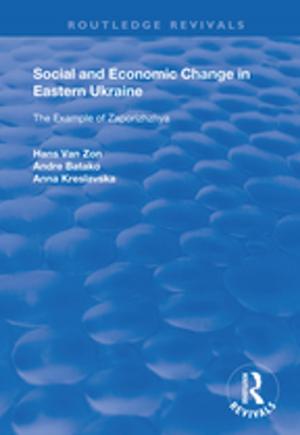Globalizing Chinese Migration
Trends in Europe and Asia
Nonfiction, Social & Cultural Studies, Social Science, Sociology| Author: | Pál Nyíri, Igor Saveliev | ISBN: | 9781351758840 |
| Publisher: | Taylor and Francis | Publication: | December 20, 2018 |
| Imprint: | Routledge | Language: | English |
| Author: | Pál Nyíri, Igor Saveliev |
| ISBN: | 9781351758840 |
| Publisher: | Taylor and Francis |
| Publication: | December 20, 2018 |
| Imprint: | Routledge |
| Language: | English |
This title was first published in 2003. Globalizing Chinese Migration is the first volume to deal comprehensively with the most recent wave of the migration from the People's Republic of China to Europe and Asia. By analyzing the Chinese state’s role in this migration, the authors dismiss as fiction the theory (sometimes advanced by hostile and racist foreign observers) that Chinese authorities are intent on using mass emigration as an expansionist tool. They go on to explain that migrants who might, in earlier times, have been reviled as traitors and absconders are today more likely to be viewed by sections of the Chinese state bureaucracy as patriots who remain part of China’s polity and economy and contribute to its standing overseas. Some senior officials, however, particularly diplomats, stress the harm done by new migrants, both to China’s economy (which loses assets as a result of the migrants’ entrepreneurial activities) and to its reputation in the world. An essential resource for academics and students alike, the volume presents important new data on aspects of Chinese migration largely neglected in the existing English-language literature. These include new forms of emigration from China (by students and by workers from the country’s north-eastern provinces) and emigration to destinations (including Russia, Southeast Asia, and Japan) normally unremarked by students of population movements.
This title was first published in 2003. Globalizing Chinese Migration is the first volume to deal comprehensively with the most recent wave of the migration from the People's Republic of China to Europe and Asia. By analyzing the Chinese state’s role in this migration, the authors dismiss as fiction the theory (sometimes advanced by hostile and racist foreign observers) that Chinese authorities are intent on using mass emigration as an expansionist tool. They go on to explain that migrants who might, in earlier times, have been reviled as traitors and absconders are today more likely to be viewed by sections of the Chinese state bureaucracy as patriots who remain part of China’s polity and economy and contribute to its standing overseas. Some senior officials, however, particularly diplomats, stress the harm done by new migrants, both to China’s economy (which loses assets as a result of the migrants’ entrepreneurial activities) and to its reputation in the world. An essential resource for academics and students alike, the volume presents important new data on aspects of Chinese migration largely neglected in the existing English-language literature. These include new forms of emigration from China (by students and by workers from the country’s north-eastern provinces) and emigration to destinations (including Russia, Southeast Asia, and Japan) normally unremarked by students of population movements.















